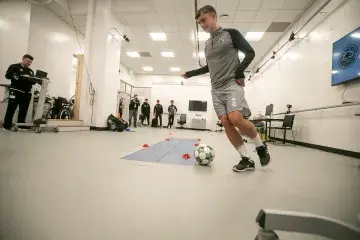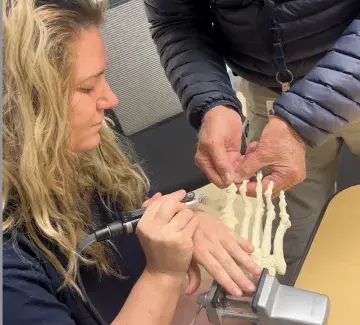SMU to Johns Hopkins: Doctor of Occupational Therapy Student Awarded Prestigious Fellowship

Samuel Merritt University is proud to announce that Chloe Campion, a student in the Doctor of Occupational Therapy (OTD) program, has been awarded the prestigious Johns Hopkins Occupational Therapy Acquired Brain Injury Fellowship. The 12-month fellowship, beginning in August, provides an immersive post-professional program that fosters value-based neurorehabilitation for adults with acquired brain injury.
Chloe discovered occupational therapy while pursuing her bachelor’s degree in Kinesiology at Sonoma State University. “I realized how deeply it aligned with my strengths and desire to support others in meaningful ways,” Chloe explains. Inspired by personal role models like her mother who pivoted careers to pursue nursing case management, Chloe saw firsthand the impact of compassion and persistence in healthcare. Growing up neurodivergent and navigating learning disabilities, she realized that her adaptability and problem-solving strengths aligned closely with the profession of occupational therapy.
“I’m continually drawn to OT because of its holistic and intimate approach [to] helping people with the aspects of life that matter most to them,” Chloe says, reflecting on why she feels a connection to the field.
Chloe’s participation in a Community Participant Lab at SMU with Dr. Jack Kleine solidified her decision to pursue neurological rehabilitation. Alongside a team of staff, Chloe cared for a gunshot wound patient who she says had “unfortunately fallen through the cracks of the healthcare system…without [receiving] the rehabilitation support he needed.” By providing hands-on instruction, discussing solutions, and walking the team through challenges, Dr. Kleine’s mentorship fostered Chloe’s clinical reasoning and practical skills.
“Witnessing the client’s progress during my time with him and hearing about his continued improvements in the next lab was incredibly motivating and affirmed my desire to work with individuals recovering from complex injuries,” she recalls.
“I’ve always considered Oakland home,” says Chloe, recounting why she chose SMU. “I love the community, the culture, and the spirit of resilience the city embodies. SMU reflects that same spirit.” As a neurodivergent student, Chloe especially recognized how welcomed she felt in the OT department, noting that the cohort fully embraced her and provided an invaluable sense of belonging. Through the support and collaboration of faculty and clinical instructors, she felt encouraged to explore specialized interests within her OT program and pursue a fellowship.
Chloe attributes this next step in her career to “SMU’s culture of nurturing student passions and supporting non-traditional paths.” Reflecting on how the University’s support helped bolster her confidence, she says, “I’m grateful that SMU not only taught me clinical skills but also empowered me to dream big and follow a specialized path in OT.”
Although Chloe’s neurodivergence presented many challenges as a student, she takes pride in her identity and its unique perspectives, stating, “my neurodivergence has also become one of my greatest strengths as a clinician.” The process of learning how to advocate for herself in a field where some doubt her abilities in demanding clinical settings gives Chloe the unique ability to connect with her patients.

“I relate deeply to patients who are learning to adapt to new realities because I’ve had to do the same in my own life. I find joy in the small victories when patients make progress, no matter how subtle,” Chloe shares.
With only one fellow selected per year, the Johns Hopkins Occupational Therapy Acquired Brain Injury Fellowship features over 500 hours of didactic and clinical education, 1,200 hours of direct patient care, and results in graduates becoming a Certified Brain Injury Specialist (CBIS) through the Academy of Certified Brain Injury Specialists (ACBIS).
“This fellowship represents the culmination of years of personal growth, resilience, and unwavering dedication to the field of occupational therapy,” says Chloe, who observes that her challenges in academic and clinical environments has only made this opportunity more meaningful. “This fellowship also symbolizes a chance to deepen my expertise and serve individuals with complex needs, like the client I worked with at SMU, who have been overlooked by the system.” She adds, “It’s an opportunity to be part of a team that prioritizes equity, innovation, and excellence in patient care.”


